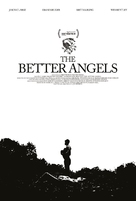Reviews provided by RottenTomatoes
Kyle Smith, New York Post: Rendering the life of young Abraham Lincoln as a tone poem, "The Better Angels" sags under the weight of its own resolute earnestness. Read more
John Hartl, Seattle Times: Narrators tell us what to feel, but there's something hollow at the center. The tone of the picture seems perversely oblique. Read more
Peter Debruge, Variety: Whereas other directors have presented the man in mythic terms, "The Better Angels" renders young Abe relatable, provided auds are willing to put themselves on the film's wavelength. Read more
Mike D'Angelo, AV Club: It comes across as an apprentice work, not unlike the second-rate versions of paintings created by students who would work at the side of Renaissance masters. Read more
Peter Keough, Boston Globe: Had Terrence Malick taken a shot at making a Ken Burns movie, it would probably have turned out better than "The Better Angels," A.J. Edwards's humorless, pretentious black-and-white tone poem about a very young Abe Lincoln. Read more
Jeff Labrecque, Entertainment Weekly: It feels more like a poem. Or, at times, a symphony. But it's much less effective as an actual movie. Read more
Todd McCarthy, Hollywood Reporter: Thanks to its indelible image-making and dedication to what could be termed lyrical realism, The Better Angels notably succeeds in creating a vivid impression of the physical and familial circumstances that crucially shaped [Lincoln's] heart and mind. Read more
Michael Rechtshaffen, Los Angeles Times: All that extensively researched authenticity and soul-stirring cinematography go only so far in establishing a compelling connection to a specific time and place. Read more
Joe Neumaier, New York Daily News: If you succumb to "The Better Angels," the effect is like falling into a gorgeous photograph, but that also means the narrative in this arthouse film is oblique and sketchy. Read more
Manohla Dargis, New York Times: The sense of predestination hangs heavily over the movie, but not a sense of life. Read more
Steven Rea, Philadelphia Inquirer: "God tells truths in parables," someone says - a line that Edwards most likely aspires to take possession of, as if his poetic, pictorial parable had its own truths to tell. Read more
Colin Covert, Minneapolis Star Tribune: The narrative is gentle and sparse. The beautifully photographed imagery, shot in elegant, deep-focus black-and-white, is exceptional. The music is richly classical. Read more
Brad Wheeler, Globe and Mail: A gorgeous look at the raw, wooded Indiana of the early 1800s and a dreamy study of the boy Lincoln who was destined to leave it behind. Read more
Bruce Demara, Toronto Star: History, as subject matter, is hard enough to sell as cinema. The Better Angels will not make the struggle any easier. Read more
James Rocchi, TheWrap: Those who appreciate Mr. Edwards' appropriation of Mr. Malick's approach will find "The Better Angels" lives up to its aspirations; those with no patience for shots of wind on crops will find the film crashes on the sharp-rocked shore of its pretensions. Read more
Joshua Rothkopf, Time Out: The overall effect is close to parody, tinged by a frustrating coyness that refuses to identify its protagonist (Braydon Denney) by name for the entire running time. Read more
Abby Garnett, Village Voice: Kruger and Clarke do their best to look steadfast with a camera swooping around them like a wounded bird, but there's no rescuing this imprecise family portrait from its own impulses toward obscurity. Read more
Stephanie Merry, Washington Post: Just as those around Lincoln grow frustrated by his obscurity, so may audiences watching "The Better Angels." Read more

